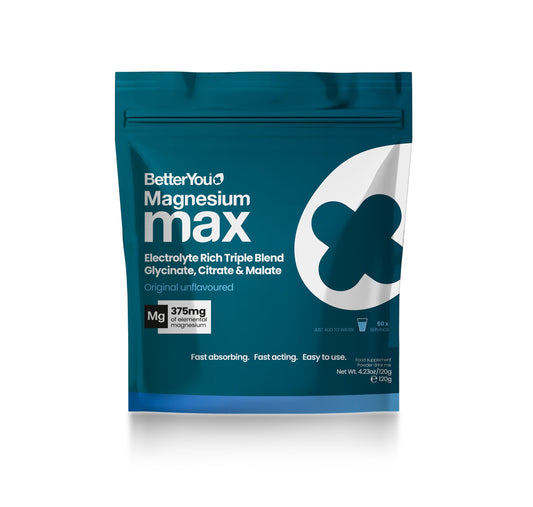Maintaining the right magnesium levels is essential for bone, muscle, and psychological health. Magnesium is responsible for 325 chemical reactions in your body and having low levels can cause health issues, from trouble sleeping, to a decreased appetite. Knowing the optimum magnesium levels for your body and how to achieve them can help you support your overall wellbeing.
Table of Contents:
- What are Optimal Magnesium Levels?
- 5 Signs of Magnesium Deficiency
- Causes of Low Magnesium Levels
- 5 Benefits of Magnesium
- How to Boost Your Magnesium Levels
- 5 High Magnesium Symptoms
- Causes of High Magnesium Levels
- Magnesium for the Whole Family
What are Optimal Magnesium Levels?
The first step to understanding magnesium levels is to know exactly what they should be. A blood test can be done to check how much magnesium you have in your body. If you are low on this vital mineral, you can easily top up with magnesium supplements.
To reach this optimal mineral saturation, Public Health England has recommended the magnesium daily intake for each age group:
|
Age |
Recommended daily intake of magnesium |
|
Adults 18+ Male |
350mg |
|
Adults 18+ Female |
300mg |
|
Pregnant women |
300mg |
|
Children aged 10-17 Female |
300mg |
|
Children aged 10-17 Female |
250mg |
|
Children aged 3-9 |
230mg |
|
Children aged 1-2 |
170mg |
|
Infants aged 7-11 months |
80mg |
The AI (Adequate Intake) is based on the minimum daily requirement for the majority of individuals based on age and gender. However, some may require more if they are deficient or have low levels in order to elevate magnesium levels.
If you are concerned about your magnesium levels, have underlying health conditions, or are on prescription medications we would recommend discussing with your GP or pharmacist before starting any supplementation.
The normal range for blood magnesium levels should fall between 0.7-1.0 nmol/L.
5 Signs of Magnesium Deficiency
Having too low a level of magnesium could lead to a mineral deficiency. Magnesium deficiencies have a number of signs to look out for:
-
Poor Sleep - magnesium plays a vital role in sleep. Low magnesium levels could leave you struggling to nod off at night. Sleep supplements fortified with magnesium can help you experience a restful sleep.
- Fatigue - this mineral is essential in the function of muscles, having insufficient magnesium levels could lead to a buildup of lactic acid. This in turn can leave you feeling tired and fatigued. Ensuring you take a natural energy supplement alongside magnesium supplements could help to rectify this.
- Decreased Appetite - decreased magnesium levels have been linked to a reduction in appetite. Increasing your levels should help to counter this.
- Nausea - an early sign of low magnesium levels is nausea and even vomiting.
- Weakness - as this vital mineral is important for muscle function, a low level can cause you to feel weak - especially when in combination with a reduced appetite.
If you are experiencing any of these symptoms, you may have low magnesium levels, this can also be known as hypomagnesemia. If you have any health concerns you should always speak to your doctor.
How to Boost Your Magnesium Levels
Increasing your magnesium levels is easy with BetterYou. Our range of transdermal magnesium supplements is an effective way to increase your nutritional reference value magnesium dose safely.
Bypassing the digestive system, there is no upper limit on how much topical magnesium you can take. We have 6 different formulations to support your wellbeing today:
- Drinks - magnesium water offers a fast, convenient way to increase magnesium levels for optimal hydration, focus, and energy.
- Spray - magnesium sprays are formulated as an oil that can be easily applied to the skin. These can help with muscle stiffness, ideal for using as a sports supplement.
- Cream - magnesium creams are a rich and nourishing source of the mineral. These are gentle enough to be used on dry and eczema prone skin. Just 5ml of our body lotion contains 21.5% NRV (nutrient reference value).
- Lotion - magnesium lotions are an effective way to absorb the mineral, with 5ml delivering 120mg of magnesium.
- Bath Flakes - allow your magnesium levels to increase whilst indulging in a mineral-rich bath. Magnesium flakes are similar to epsom salts, but flakes are made from magnesium chloride, whilst salts are made from magnesium sulphate.
- Gel - magnesium gel will deliver a regulated release, perfect for promoting muscle health during sports. 1ml provides 100mg of magnesium, which is 28% NRV.
Causes of Low Magnesium Levels
A decrease in magnesium levels can be caused by a variety of factors:
- High calcium levels - magnesium and calcium work in tandem to support bone health. But too much calcium can affect magnesium absorption.
- Not getting enough magnesium from your diet.
- Gastrointestinal diseases - such as celiac and Crohn's disease
- Reduced ability to absorb magnesium due to diet high in refined sugars and processed fats
For those who do not have optimal magnesium levels, you can give yourself a daily boost with transdermal magnesium.
5 High Magnesium Symptoms
High magnesium levels can also cause symptoms that may have you concerned; this condition however is rare. The signs to look out for include:
- Nausea & vomiting
- Unusually low blood pressure
- Headaches
- Fatigue
- Struggles with breathing
For those concerned they have hypermagnesemia (high magnesium levels), you should talk to your doctor.
Causes of High Magnesium Levels
Our kidneys usually filter excess magnesium levels from our blood and expel them in our urine. One of the key causes of high magnesium levels is kidney failure, when this organ stops functioning properly. However, some people may have this condition simply from consuming too much of the mineral in their diet.
Magnesium for the Whole Family
Ensuring you reach the recommended magnesium levels is vital at every stage of life. In fact, pregnant women need a higher daily intake of magnesium due to supporting both themselves and their baby. Our pregnancy supplements and prenatal vitamins have mineral supplements safe for use whilst pregnant.
You can support your child as they grow with magnesium supplements for kids. Being transdermal, you can wave goodbye to tantrums when boosting your child’s levels. Taking these alongside children’s vitamins can help to encourage your little one’s health and reduce their risk of mineral deficiencies.
Innovative Supplementation with BetterYou
We pioneered vitamin oral sprays and transdermal magnesium. Our range of vitamin D supplements, vitamin B supplements, and multivitamins can help to support a healthy lifestyle.


















